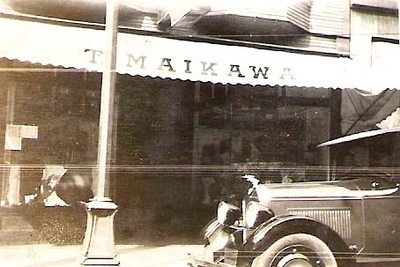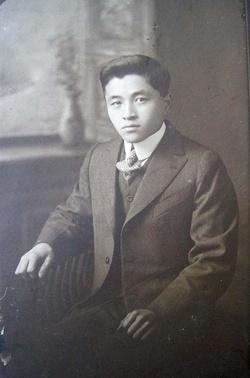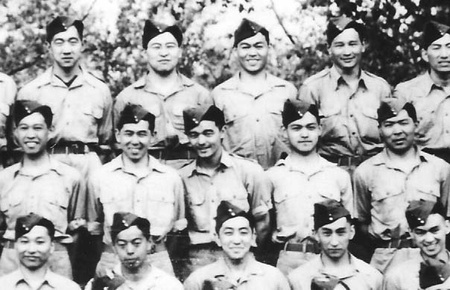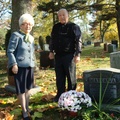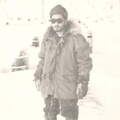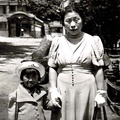Pre-War Days & Immigration
The story started sometime in the mid-1920s when my father, Bungoro Maikawa’s oldest brother, Tomekichi immigrated to Canada and made some money fishing around Prince Rupert. Later, my uncle, Tomekichi-san rented a store on Powell Street, Vancouver before he bought it outright and started small but since he had another business in Japan, he asked his good friend, Kisaku Hayashi to run the store for him as he had to go back and forth too much to Japan.
Tomekichi-san’s business in Matsubara, Japan, was in the lumbering business, same as what my mother’s father was doing in Hose, now part of Hikone in Shiga Prefecture. I think that’s why my father, Bungoro went to a technical high school, probably influenced by his oldest brother, Tomekichi-san so that he can use him in his lumbering business. My father was a skilled carpenter and was also able to build things without using nails—the real old fashion way.
Mr. Hayashi told me after the war in Toronto that it was very tough during those days and when it was rent collection day of the month he sometime had to ask another employee to look out for the rent collector so he could hide inside the counter cupboard until the coast was clear.
The store was called Maikawa Shoten (store) by the Issei and I was informed later that its official legal name was T. Maikawa Stores Limited and quite huge in my eyes as I was still very young from age five to almost nine.
The address was 369 Powell St. Just about a quarter of the street away on the other side, opposite to that corner was The Powell Street Grounds where the Asahi Baseball team played long ago and my cousin Mickey Maikawa (now 100 years old) used to be one of the pitchers. Mickey is the son of Sadakichi Maikawa (my father’s older brother) who owned Nippon Autos dealer-garage business—sales and service and they were near just around the block. When home-runs were hit, the balls sometime banged against the houses across the street at the back of the field.
Life in Vancouver’s Japantown
The store was just renovated previous to the war and at its prime, thriving at its peak with everybody living well. All my father’s brothers had businesses close-by, Japanese owned hotels, rooming houses, communal bath houses (furoya), restaurants like the Maikawa Fuji Chopsuey, Taishodo Drug Store, Furuya grocery store, Maikawa Fish store, Maikawa Nippon Auto sales and service garage and other competing stores. Shibuya was another store but I can’t remember what they sold as I don’t remember going in there—maybe it was a competitor? The Maikawa Shoten was the largest.
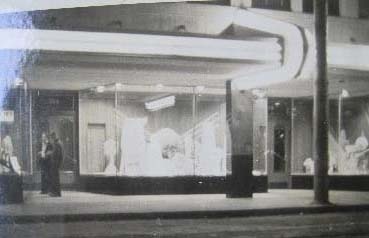
Official name - T.Maikawa Stores Limited - 1940 after renovations. Tomekichi-san had plans for more stores in future.
There was a bank at the corner opposite to Powell Grounds but I don’t know if it was owned by Japanese. I’m sure there were plenty more but I can’t remember. Close-by, there were J-Christian churches (there are stories about their churches being sold off too while the congregations were in internment camps, not by the government but by the Anglican and United churches). There was also a Buddhist Temple near-by. A Japanese language school (Alexander School) was close-by for “higher grades”???
The children went to a public school closeby called Strathcona and the high school, Britannia. I wasn’t living around there so I don’t even know if my spelling is even correct. There were judo and kendo clubs operating but I don’t know where those where located. I had a kendo outfit and a bamboo sword but I just used it playing around with the Caucasian friends in the bushes.
Most of the Japanese families lived very close around the perimeter of J-town. So, J-town was really a self-contained village on its own. I guess the Maikawas were some of the prominent people and the core foundation at that time of J-town, Nihon machi.
All the kids had to go to the Japanese language school so they were just about all bilingual. On the other hand, kids living further away from J-town didn’t have the opportunity to study the Japanese language as transportation was the problem. The talk used was unique in that it was whatever easiest words (English or Japanese) that came out and sometimes talking to Caucasian friends went that way too and they would pick it up and mix Japanese in their sentences too—ha, ha. The older Nisei wrote and spoke Japanese well as they were graduates of high school Japanese language already and they got a lot of practice dealing with the Issei. (People like cousin, Shig Oue’s age, were very fluent in both writing and speaking.)
My father was the youngest amongst five brothers and when he graduated from a technical high school in Japan his oldest brother, Tomekichi-san sent him to Vancouver to help Mr. Hayashi manage the store. When Dad became settled, his brother told him to come back to Japan as he picked out a woman for him that agreed to marry him but when he met her, he didn’t want her but instead chose to marry my mom, Jun Ogawa from another village whose family he knew was in the same lumbering business as Tomekichi-san.
The two families were already related through marriages as well. Tomekichi-san was married to Kiri Natsuhara, sister of my mom’s mother, Sue Natsuhara. This is what my aunt, Aiko Nakamura (nee Ogawa and Mom’s sister) in Hikone told me. At the Maikawa store, there was another employee, Hane Oue (Shig Oue’s father) who was married to my father’s twin sister, Shina through arranged marriage and he was part of the managing team also. Shig is the one that joined the Intelligence Corp. along with Tom Nishio later after being interned. Tomekichi-san’s son, Tokio-san came into the picture much later (cousins, Frances and Yoko’s father).
Tomekichi-san, by that time was very rich and Tokio-san arrived in Vancouver married to a daughter, Misao-san of another lumbering prominent rich family of Japan. He was sent to learn the business and become part of the managing team also. Just before the war around 1940, the store was renovated and expanded and the business was at its peak.
To make the story short, soon after the war started the store was considered enemy property and everything was confiscated with a government custodian coming in freezing the money in the bank as well.
© 2013 Frank Maikawa


